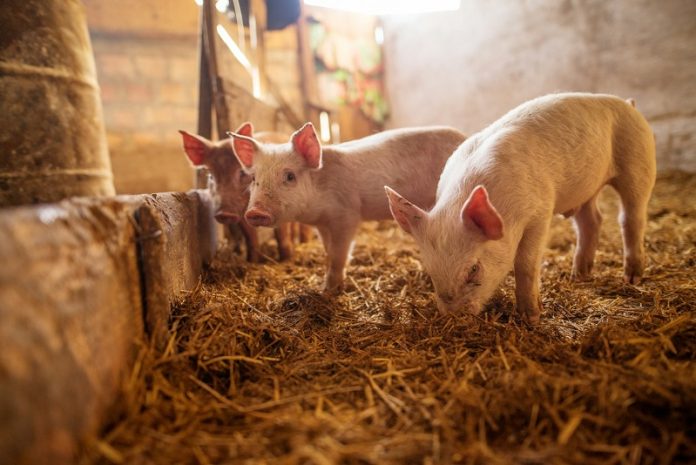
No one wants their pig to develop diamond skin disease, an infection that can cause pain and potentially lead to death if untreated.
Dr. Kevin Washburn, a professor at the Texas A&M School of Veterinary Medicine & Biomedical Sciences, and Dr. Bridget Savitske, a veterinary resident in large animal internal medicine, explain the signs of this common pig disease and how to prevent it with help from your veterinarian.
Diamond skin disease, also known as Erysipelas, is one of the oldest and most common diseases in pigs.
It gets its name from the diamond-shaped patterns that can appear on an infected pig’s skin.
The disease starts as a minor illness and can worsen with symptoms such as high fever, loss of appetite, depression, and diamond-shaped skin lesions. If left untreated, it can be fatal.
“Diamond skin disease causes vasculitis, or inflammation of the blood vessels, leading to the diamond-shaped patterns on the skin,” Washburn explained. “These patterns are areas that have lost blood flow.”
However, it’s important to note that the diamond shapes don’t always appear.
“The disease can take many forms,” Savitske said. “Because it causes sepsis, a severe response to infection, it can affect almost any organ and show up in different ways.”
Although diamond skin disease is common, it can be hard to diagnose. The most important sign for pig owners to watch for is changes in behavior.
“Affected pigs will become lethargic, stop eating, and quit their usual activities,” Washburn said. “In non-pigmented breeds or pigs with light-colored areas, discolored skin lesions may develop.”
If you notice any signs of abnormal behavior in your pig, it’s crucial to take them to a veterinarian immediately.
The good news is that diamond skin disease is easily preventable through vaccination.
“Pigs should be vaccinated as weanlings, once they start eating food other than their mother’s milk, and then receive a booster shot at least three weeks later,” Washburn advised. “After that, they need an annual vaccination.”
Many vaccines for diamond skin disease come in combination with vaccines for other illnesses, making it easier to keep your pig protected.
“There is a combination vaccine that includes protection against respiratory diseases and reproductive tract diseases,” Washburn said.
While pigs are the primary carriers of diamond skin disease, humans can also be infected through skin contact or sepsis if exposed. To prevent spreading the disease, keep your pig outside the house and practice good hygiene.
“Since the disease spreads through fecal matter and nasal secretions, avoid chewing your fingernails, kissing your pig, or bringing the bacteria near your face,” Savitske warned.
Pigs typically contract diamond skin disease through contaminated soil. To reduce the risk, ensure your pig has clean bedding, fresh water, and store their food in a sanitary location.
By vaccinating your pig annually, watching for signs of illness, and maintaining a clean environment, you can help your pet pig avoid diamond skin disease and enjoy a healthier life.



